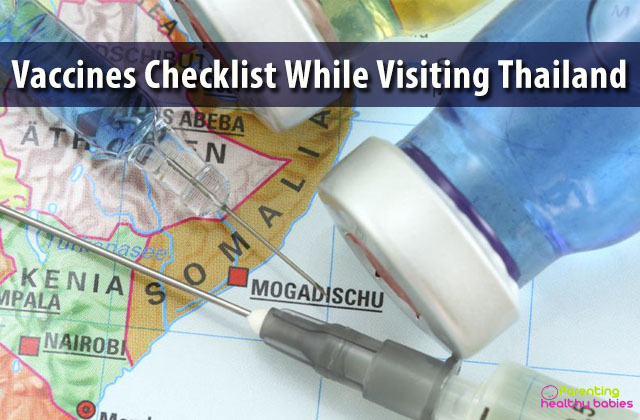Thailand is a collage of animated scenes that comprise bustling modern cities crowded with motorbikes and tuk-tuks, Buddhist temples tended by orange-robed monks, hill tribes selling handicrafts, lush landscapes dotted with traditional farming villages, ancient ruins and stunning coastlines peppered with gorgeous beaches and blue lagoons. But, before travelling to Thailand, you must take the CDC travel vaccines given below.
Recommended CDC Travel Vaccines for Thailand
Hepatitis A (Contaminated Food or Water)
Hepatitis A is a virus that infects the liver and like hepatitis B or C, it is also unique. We catch this predominantly from food and it’s oftentimes now cooking will kill hepatitis A. So, it’s your uncooked food that is gonna put you at risk for hepatitis A. So this is your salads your Brussels sprouts, lettuce any food really that is raw if it’s handled by somebody who has hepatitis A, who hasn’t washed their hands since they might have used the bathroom.
For example, it’s usually a fecal-oral sort of transmission then that could get on your food you eat that you could get hepatitis A. If you’re gonna travel to Thailand, then you must know there’s a higher rate of hepatitis A in these areas. Many parts of the world are the rates might be higher and if you’re gonna travel and eat sort of you know roadside stand kind of eating that it would be a good protection to have CDC travel vaccines. If you’re gonna be drinking boiled water, bottled water, cooked food you’re not really at risk but it’s a vaccine to consider especially if you want to have that just freedom to eat anything.
Read More: Jaundice in Children: Symptoms, Causes, and Treatments
Cholera (Contaminated Food or Water)
The CDC recommends cholera vaccination for travellers to Thailand. Due to the higher rates of cholera transmission in some areas, vaccination is key to protection against the disease. Other ways to avoid cholera by staying away from contaminated food and water. Be sure to wash your hands frequently.
Read More: 21 Food that Help Fight Infection in Children
Typhoid (Contaminated Food or Water)
A new vaccine that could prevent up to nine-in-10 cases of typhoid fever has been recommended by the World Health Organization. Experts say it could have a “huge impact” on the 22 million cases, and 220,000 deaths, from typhoid each year. Crucially it works in children who are at high risk of the infection, unlike other typhoid vaccines. It is hoped the vaccine could eventually help countries eliminate typhoid. Typhoid fever is caused by Salmonella Typhi bacteria and patients have prolonged fever, headache, nausea, loss of appetite, constipation and one-in-100 cases it causes fatal complications.
The bacteria are highly contagious and spread through contaminated food or water. The infection is most common in countries with poor sanitation and a lack of clean water, particularly in South Asia, Thailand and sub-Saharan Africa. Two typhoid vaccines already approved to help reduce the number of cases, but none are licensed for children under the age of two. Every childhood vaccine may go into a single jab. It is highly recommended to take typhoid CDC travel vaccines before travelling to Thailand.
Read More: 11 Serious Symptoms of Typhoid in Children
Hepatitis B (Contaminated Food or Water)
It is highly recommended to take hepatitis B CDC travel vaccines before travelling to Thailand. Hepatitis B vaccination has to be done for everybody. But in children immediately after delivery, Hepatitis B vaccination has to happen. The government has made it mandatory to vaccinate all the children. So that is why immediately post-delivery, Hepatitis B vaccination has to be given for children. Adults, why should they be vaccinated? Nowadays what is happening in the camps is without knowing their Hepatitis status, hundreds of patients are vaccinated.
Sometimes in those hundreds of patients, one or two patients are already Hepatitis B positive, and then they get a vaccination, then it will not work for them. In adults, it is always better to check the Hepatitis B status because of the Hepatitis B is negative, and then better to vaccinate. Otherwise, unnecessarily if somebody is Hepatitis B positive, then that is not going to work and they also think that I’m already vaccinated and how did I get the virus. So, always in adults, better to check the adults and then give the vaccination.
Rabies (Infected Animals)
Rabies is a zoonotic disease (a disease that is transmitted from animals to humans), which is caused by a lyssavirus. Transmission of the virus is achieved by entering the body through wounds (e.g. Scratches) or by direct contact with mucosal surfaces from an infected animal (e.g. Bites), it cannot cross intact skin. There are two clinical manifestations of rabies – furious and paralytic. Furious rabies is a most common form of human rabies. Rabies is a vaccine-preventable disease and you must take CDC travel vaccines before travelling to Thailand.
Read More: Dog Bite First Aid in Children: 5 First Aid Tips You Need to Know this Summer
Japanese encephalitis (Mosquito-borne)
JENVAC is a single dose inactivated Japanese Encephalitis (JE) Vaccine. This Vero cell-derived vaccine is prepared from an Indian strain (Kolar- 821564XY) of the JE virus. JENVAC has been developed in collaboration with the National Institute of Virology, India. It is a safe and highly-effective vaccine that protects against all known strains of Japanese Encephalitis. Data of 2-dose study shows that a single dose of JENVAC is sufficient to elicit the immune response as the subjects who received a single dose were 98.67% seroprotected and the 4-fold seroconversion was at 93.14% for the ≥1 year to ≤50 years age group. Never forget to take CDC travel vaccines for Japanese Encephalitis before travelling to Thailand.
Influenza (Airborne Droplets)
The most important thing for you to know about the influenza vaccine is that it’s one of the most dynamic vaccines available. It changes every year because of new antigenic variants produced by antigenic drift and that means that the vaccine you received for last year’s outbreak is not going to protect you from this year’s outbreak. Therefore if you are already vaccinated by influenza vaccine, then also, you must take CDC travel vaccines before travelling to Thailand.
Read More: Influenza in Children – Symptoms, Causes, Treatment, Prevention
Conclusion
Various mosquito-borne diseases can be in Thailand. Protozoal infection poses a threat to travellers to some regions of the country. Confirm you’re protected with antimalarials. Dengue, Zika and chikungunya can even be found in Thailand. Whereas there are not any vaccines offered for these diseases, there are steps you’ll go to stop them. Make certain to use dipterous insect repellents, netting and wear correct vesture. Medical treatment is adequate and customary in urban areas. Aid is additionally offered in rural areas, although the healthcare suppliers might not speak English.













